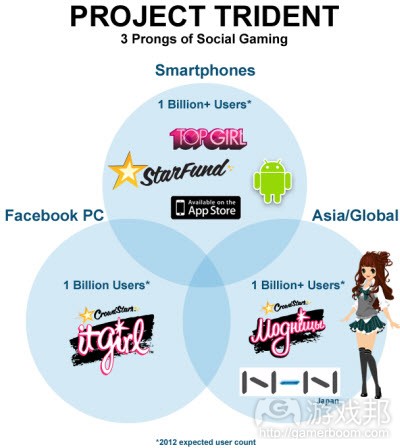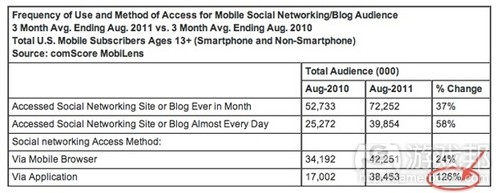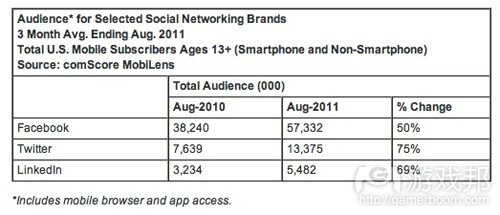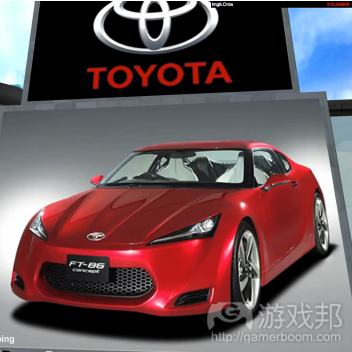每日观察:关注DeNA或收购职业棒球队等消息(10.21)
1)据《日经新闻》报道,日本社交巨头DeNA或将收购横滨职业棒球队Yokohama Bay Stars,该棒球队所属的公司TBS Holdings(一家电视广播网)已和DeNA达成初步协议,DeNA将收购TBS公司70%的股份(价值约1.3亿美元)。
观察者表示,这个棒球队实力并不强,每年亏损2600万美元左右。如果这项收购成定局,DeNA将成为继日本软银、Rakuten之后的第三家活跃于职业棒球领域的日本网络公司。
2)社交游戏公司CrowdStar日前宣布将拓展亚洲业务,实行跨平台发展战略。该公司首席执行官Peter Relan表示,公司的三个核心战略包括:1.开发主流的女性Facebook游戏;2.将此类游戏推向智能手机和平板电脑设备;3.向亚洲多个市场投放游戏。
该公司将与韩国网游戏公司NHN合作,将旗下的Gril系列游戏推向亚洲市场,在日本发布《It Gril》,并将面向韩国和中国地区发布新款游戏。
CrowdStar手机游戏《Top Girl》发布4个月下载量已超过400万次,预计其手机游戏营收将占公司今年收益的一半左右。该公司的Facebook游戏《It Girl》目前DAU为33万,MAU为340万。Girl系列游戏在所有平台上的DAU为100万,MAU为800万。
3)分析公司comScore最新数据显示,今年8月份,美国手机社交媒介用户比去年同期增加了37%,半数以上此类用户在手机上查看企业、品牌或时事内容。
尽管多数移动用户通过浏览器访问社交网站,但通过应用访问社交网络的用户增长速度比去年快5倍;移动浏览器社交网络用户增长24%,达到4230万,社交网络应用的用户在过去一年增长了126%,达到3845万。
Facebook、Twitter和LinkedIn移动用户在一年中至少增长50%,Facebook移动用户增幅为50%,已达5700万,Twitter同类用户增长率高达75%,目前为1340万,LinkedIn增长69%,最近移动用户为550万。
4)Mind Candy(游戏邦注:该公司最近因旗下游戏《Moshi Monsters》中的恶搞形象“Lady Goo Goo”而被Lady Gaga起诉)首席执行官Michael Action Smith在最近的媒体采访中表示,他个人认为类似Lady Goo Goo这种恶搞现象在美国非常普遍,而且此事也丝毫没有影响到Lady Gaga的个人形象或专辑销量,法律对这一领域的干预似乎过于苛严了。
一家伦敦法院已在上周审理此案,并裁定Mind Candy不得发布任何有关Lady Goo Goo的音乐内容。不过Action Smith表示他会以更谨慎的做法,推出《Moshi Monsters》的音乐专辑。
5)丰田汽车公司最近通过一款Facebook游戏《Social Network Racer》推广即将在东京汽车展亮相的跑车,该游戏鼓励玩家通过“试驾”新车赢取免费去日本旅游并与新车设计师会面的大奖。
该游戏使用了Adobe Flash Player 11的3D加速图像,而且还支持用户创建并管理自己的车赛,与其他Facebook好友一决高下。
丰田汽车过去曾与Cie Games合作,在今年1月份通过后者旗下游戏《Car Town》推广在底律特车展亮相的普锐斯车型。
6)伦敦大学研究人员最近指出,人们所拥有的Facebook好友数量对其大脑智力具有一定影响。
该调查以125名Facebook大学生用户为样本,并将他们的大脑智商与其他40名学生进行对比。结果发现,拥有大量Facebook好友的学生大脑的右颞上沟、左颞中回和内嗅皮质中的灰质密度较大,由此可推测在社交网络中交际面较广的用户大脑更具社会认知能力。
研究人员还与拥有大量现实好友的用户大脑进行了对比,但发现仅有在线社交网络用户的大脑出现了上述情况。研究人员指出,这项调查结果或许有助于研究社交网络对人类大脑的影响。(本文为游戏邦/gamerboom.com编译,拒绝任何不保留版权的转载,如需转载请联系:游戏邦)
1)DeNA To Buy Japanese Pro Baseball Team [Social Games]
by Dr. Serkan Toto
What do you do when you’re a Japanese social game company with 30 million users, have been running TV ads for years, sit on US$728 million pre-tax profit from last fiscal and need to widen your member base? You try to buy a pro baseball team, just like DeNA.
The Nikkei reported Tuesday that DeNA is in negotiations with Tokyo Broadcasting System Holdings, a listed company, to acquire baseball club Yokohama BayStars. According to the paper, DeNA and TBS have already reached a basic agreement under which DeNA will buy TBS’ 70% stake for about US$130 million.
I don’t know baseball, but the club is apparently pretty weak and posts US$26 million in losses each year. DeNA’s goal is to (primarily) boost brand recognition for Mobage in Japan.
If the deal goes through (it isn’t final yet and depends on the nod of the other teams in Japan’s pro baseball league, for example), DeNA will join two other web companies that are active in pro baseball in Japan, namely SoftBank (which owns the Fukuoka Softbank Hawks) and Rakuten (Tohoku Rakuten Golden Eagles).(source:serkantoto)
2)CrowdStar takes a stab at a global gaming audience
Dean Takahashi
Game maker CrowdStar is unveiling a new business strategy today to grow its game business into a multiplatform empire.
The new strategy, which the company is calling “Project Trident” is a three-pronged approach to take a hit franchise and leverage it across multiple platforms and multiple territories, Peter Relan, chief executive of Burlingame, Calif.-based CrowdStar, told VentureBeat. The three prongs are 1) creating mainstream female-oriented games for Facebook, 2) extending those games to smartphones and tablets and 3) launching the games in various markets in Asia.
To take its games global, CrowdStar is launching eight different variants of its popular games in the fourth quarter so that its shopping and fashion-oriented “Girl” franchise games (It Girl on Facebook and Top Girl on mobile) will be available in all major territories in the world across 10 different social networks on the web, iOS, and Android, Relan said.
That’s a considerable jump in distribution, since the company was pretty much Facebook only at the start of the year. ”So far it is going very well,” Relan said. While the goal is to make a game that reaches a billion users, Relan said that’s still some time away.
Relan has outlined his ambitious strategy to reach a billion gamers before.
CrowdStar will take its Girl franchise into Asia in a partnership with Korea’s online game giant NHN. In a deal with NHN Japan, CrowdStar’s It Girl will debut in the Japanese market. Sometime later, the company also hopes to launch new games in Korea and China. The company plans to introduce five versions of It Girl and Top Girl across five different social networks in Asia.
For mobile games, CrowdStar’s Top Girl game has been downloaded more than 4 million times in four months. As a result, mobile game revenues are expected to be half of the company’s revenues this year. As CrowdStar takes its games to different territories, it is customizing the art, theme, characters and other details to fit the local language and culture. It Girl has 330,000 daily active users and 3.4 million monthly active users on Facebook. But the Girl franchise across all platforms has 1 million daily active users and 8 million monthly active users across Facebook, Asia, and mobile markets.
The company is still building games for Facebook and expects to launch a game this weekend. Rivals include Electronic Arts and Zynga.(source:venturebeat)
3)ComScore: Mobile Social Networking App Audience Grows 126% In Past Year
By Alicia Eler
Analytics firm comScore released new data today showing that U.S. mobile social media audiences increased 37%, and more than half of social mobile audiences read a post from an organization, brand or event on their mobile device.
While the mobile browser accounted for more visits, research shows that the social networking app audience has grown five times faster in the past year. While the mobile browsing social networking audience has grown 24% to 42.3 million users, the mobile social networking app audience shot up 126% to 42.3 million users in the past year.
Mobile Social Networks’ Audiences: Facebook, Twitter and LinkedIn Come Out on Top
The Facebook mobile audience is fast approaching 60 million users. Facebook, Twitter and LinkedIn grew their mobile audiences by at least 50 percent in the past year. Facebook’s numbers have risen 50% from the previous year to 57 million mobile users. Twitter’s audience jumped 75% to 13.4 million users, and LinkedIn’s mobile audience grew 69% to 5.5 million users. (source:readwriteweb)
4)Since Lady Gaga v. Lady Goo Goo, Mind Candy CEO remains defiant
by Joe Osborne
Alright, so the case wasn’t really “Lady Gaga v. Lady Goo Goo,” but that sounds way cooler than “Lady Gaga v. Mind Candy.” Speaking with GamesIndustry.biz, Mind Candy CEO Michael Acton Smith said, “I’m always up for a good battle if anyone else wants to do this.” He was referring to Lady Gaga’s lawyers’ recent injunction against the Moshi Monsters creator for “The Moshi Dance,” a YouTube music video starring Lady Goo Goo, one of its many annoying if adorable parody characters.
“I think a lot of people have been surprised by the judgment,” Acton Smith said. “I personally think the law in this area is too strict and there are people looking at it for review at the moment. I think it would have been fine in the US where parody is much more acceptable. And it’s not detracting from her sales or damaging her in my opinion, and so I think it was a bit frustrating.”
The decision was reached last week in a London courthouse, but oddly enough the ruling only prevents Mind Candy from creating musical material with Lady Goo Goo–she can still exist within the game. Just as the developer readied to release the video as a single on iTunes, the lawyers swooped in. But Acton Smith told GamesIndustry.biz that he plans to press onward with an album of Moshi Monsters music and a live tour featuring the critters.
“We’re having discussions around that at the moment,” Acton Smith told GamesIndustry.biz. “But obviously we do need to be a little bit careful, because the high court must be respected when they injunct something.” The Mind Candy CEO said this in response to questions about Dustbin Beaver, the plain-as-day parody of Justin Bieber in Moshi Monsters, which boasts 50 million players these days. We hear Bieber’s lawyers’ have equally helmet-like hair that’s impervious to defense arguments. God speed, Moshlings.(source:games)
5)Toyota Uses Facebook Game As Promotional Vehicle
by David Cohen
Toyota is using a Facebook game to promote the concept sports car that it plans to debut at the Tokyo Motor Show in December.
Social Network Racer just went live yesterday, and it runs through December 31.
It allows racers across the globe to “test-drive” the new vehicle and compete for the grand prize: a free trip to Japan, where the winner will wave the checkered flag at the Toyota Gazoo Racing Festival and meet the designer of the concept car.
The game taps Adobe Flash Player 11 for 3D accelerated graphics, and it also allows users to create and host their own races, complete with personalized information from their profiles on the social network.
Players can compete against friends or the Facebook community at large in Toyota-hosted races.
Toyota has raided the Facebook games garage in the past, teaming up with Cie Games in January to promote the introduction of its new Prius line at the Detroit Auto Show within the game Car Town.(source:allfacebook)
6)The More Facebook Friends You Have, The Bigger Your Brain? Researchers Say Yes
By Kelsey Blair
Think Facebook is just impacting your social life? Think again. New research suggests Facebook may be changing your brain.
Researchers at the University College London have found a connection between the number of Facebook friends a person has and the amount of “grey matter” in the amygdala, the sulcus, the left middle temporal gyrus, the right entorhinal cortex, and the superior temporal sulcus. “Grey matter” in the brain is the layer where mental processing takes place. While the study uses Facebook as an example, the results point to the impacts the Internet and social networking may be having on our brains.
The study titled “Online Social Network Size is Reflected in Human Brain Structure” used magnetic resonance imaging, more commonly known as an MRI, to study 125 university students who were Facebook users. The researchers took the results from the brains’ of the Facebook users and compared them to another group of 40 students.
In (very) scientific terms, the abstract summarizes their findings: “We show a biological basis for such variability by demonstrating that quantitative variation in the number of friends an individual declares on a web-based social networking service reliably predicted grey matter density in the right superior temporal sulcus, left middle temporal gyrus and entorhinal cortex.” The abstract concludes: “Taken together, our findings demonstrate that the size of an individual’s online social network is closely linked to focal brain structure implicated in social cognition.” The study also linked the thickness of the grey matter in the amygdala to the number of “real-world” friends people have. However, according to Reuters “the size of the other three regions appeared to be correlated only to online connections.
In plain English the study suggests that there is a strong connection between the size of parts of the brain and the number of connections a person makes on Facebook (the number of Facebook friends they have). Ryota Kanai, one of the researchers, notes that: “The exciting question now is whether these structures change over time — this will help us answer the question of whether the Internet is changing our brains.” Geraint Rees, also of University College London expresses Kanai’s excitement noting, “Online social networks are massively influential, yet we understand very little about the impact they have on our brains. This has led to a lot of unsupported speculation the Internet is somehow bad for us.” He continued, “This shows we can use some of the powerful tools in modern neuroscience to address important questions — namely, what are the effects of social networks, and online social networks in particular, on my brain.”
So, should you go and add as many people as you can to your Facebook friend list? Not quite says Heidi Joahnsen-Berg from Oxford. While she was not involved in the research, she was quick to note that, “The study cannot tell us whether using the Internet is good or bad for our brains.” She hit the point home saying, “”If you got yourself 100 new Facebook friends today then your brain would not be bigger tomorrow.”
Even so, it’s exciting to consider that social networking could be impacting the way our brains work.(source:socialtimes)














































 闽公网安备35020302001549号
闽公网安备35020302001549号